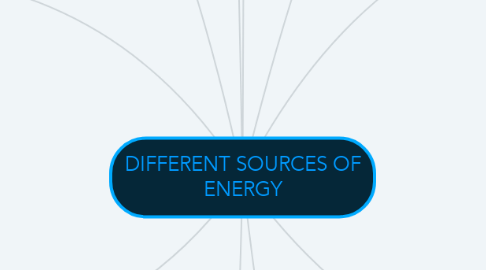
1. TIDAL ENERGY
1.1. ADVANTAGES OF TIDAL ENERGY
1.1.1. 1. It still has some environmental effects. 2. It is an intermittent energy source. 3. It should be close to land. 4. It is expensive. 5. It is not cost-effective. 6. It is still considered a new technology 7. It requires long gestation time.
1.2. DISADVANTAGES OF TIDAL ENERGY
1.2.1. 1. It is renewable. 2 It is green. 3. It is predictable. 4. It is effective at low speeds. 5. It has a long lifespan. 6. It reduces foreign importation of fuel. 7. It serves as coastal protection.
2. BIOMASS ENERGY
2.1. ADVANTAGES OF BIOMASS
2.1.1. 1. It’s a renewable form of energy 2. It’s carbon neutral 3. Widely available 4. It’s cheaper compared to fossil fuels 5. Minimizes overdependence on traditional electricity 6. Reduces amount of waste in landfills 7. Can be Used to Create Different Products
2.2. DISADVANTAGES OF BIOMASS
2.2.1. 1.Not entirely clean 2.Risk of deforestation 3. Requires a great deal of water 4.Inefficient as Compared to Fossil Fuels
3. GEOTHERMAL ENERGY
3.1. ADVANTAGES OF GEOTHERMAL ENERGY
3.1.1. 1. Environmentally Friendly 2. Renewable 3. Huge Potential 4. Sustainable / Stable 5. Heating and Cooling 6. Reliable 7. No Fuel Required 8. Rapid Evolution
3.2. DISADVANTAGES OF GEOTHERMAL ENERGY
3.2.1. 1. Location Restricted 2. Environmental Side Effects 3. Earthquakes 4. High Costs 5. Sustainability
4. HYDROGEN ENERGY
4.1. ADVANTAGES OF HYDROGEN ENERGY
4.1.1. 1.It’s a Renewable Energy Source and Bountiful in Supply 2. Numerous Sources to Produce Hydrogen Locally 3. It is Practically a Clean Energy Source 4. Hydrogen Energy is Non-toxic 5. The Use of Hydrogen Greatly Reduces Pollution 6. It’s Far More Efficient Than Other Sources of energy 7. Used For Powering Space Ships 8. A Sustainable Production System
4.2. DISADVANTAGES OF HYDROGEN ENERGY
4.2.1. 1. Hydrogen Energy is Expensive 2. Storage Complications 3. It’s Not the Safest Source of Energy 4. Tricky to Move Around 5. It is Dependent on Fossil fuels 6. Hydrogen Energy Cannot Sustain the Population
5. NUCLEAR POWER
5.1. ADVANTAGES OF NUCLEAR POWER
5.1.1. 1. Nuclear energy is an extremely reliable form of energy. 2. It is one of the safest energy resources we have. 3. Nuclear energy is incredibly affordable. . It is a proven resource. 5. Nuclear energy is an environmentally friendly power option. 6. It is one of the most efficient sources of power we know. 7. Nuclear energy is also one of the densest forms of energy we know. 8. It creates its own fuel for future production needs. 9. Nuclear energy is suitable for multiple applications. 10. It has a negligible amount of loss.
5.2. DISADVANTAGES OF NUCLEAR POWER
5.2.1. 1. Nuclear energy offers potential dangers that are not associated with other power resources. 2. It can be turned into dangerous weapons. 3. Nuclear energy creates harmful waste. 4. It creates health problems for people who are exposed. 5. Nuclear energy has costs that are not calculated into capital expenses. 6. It is not a renewable energy resource. 7. Nuclear energy doesn’t have the same levels of stockpiled resources. 8. It requires mining. 9. Nuclear energy, when not distributed efficiently, can experience high losses.
6. FOSSIL FUELS
6.1. ADVANTAGES OF FOSSIL FUELS
6.1.1. 1. Fossil fuels are a finite resource. 2. Fossil fuels are often cheap because of subsidies. 3. Fossil fuels combust to create an acidic environment. 4. Fossil fuels can damage the environment through human error. 5. Fossil fuels aren’t a technology. 6. Fossil fuels may contribute to public health issues. 7. Fossil fuels can be dangerous to harvest.
6.2. DISADVANTAGES OF FOSSIL FUELS
6.2.1. 1.Fossil fuels are a technology that is globally developed. 2. Fossil fuels are both cheap and reliable. 3. Fossil fuels have become safer over time. 4. Fossil fuels still have plenty of availability. 5. Fossil fuels contribute to the overall welfare of an economy.
7. WIND ENERGY
7.1. ADVANTAGES OF WIND ENERGY
7.1.1. 1. Wind Energy Is Renewable & Sustainable 2. It’s Good For The Environment 3. It Reduces Fossil Fuel Consumption 4. Wind Energy is Free 5. Wind Turbines Have A Small Footprint 6. Both Industrial & Domestic Wind Turbines Are Available 7. Wind Energy Can Provide Power to Remote Locations 8. Wind Technology is Becoming Cheaper 9. Wind Turbines Are Low Maintenance 10. Wind Energy Has Low Running Costs 11. It Has Huge Potential 12. It Can Increase Energy Security 13. The Wind Energy Industry Creates Jobs
7.2. DISADVANTAGES OF WIND ENERGY
7.2.1. 1. The Wind Fluctuates 2. Wind Turbines Are Expensive 3. Wind Turbines Pose a Threat to Wildlife 4. Wind Turbines Are Noisy 5. Wind Turbines Create Visual Pollution
8. WAVE ENERGY
8.1. ADVANTAGES OF WAVE ENERGY
8.1.1. 1. Renewable 2. Environment Friendly 3. Abundant and Widely Available 4. Variety of Ways To Harness 5. Easily Predictable 6. Less Dependency on Foreign Oil Cos 7. No Damage to Land 8. Reliable 9. Huge Amounts of Energy can be produced 10. Offshore Harnessing of Wave Power
8.2. DISADVANTAGES OF WAVE ENERGY
8.2.1. 1. Suitable to Certain Locations 2. Effect on Marine Ecosystem 3. Source of Disturbance for Private and Commercial Vessels 4. Wavelength 5. Weak Performance in Rough Weather 6. Noise and Visual Pollution 7. The Costs of Production
9. HYDROELECTRIC ENERGY
9.1. ADVANTAGES OF HYDROELECTRIC ENERGY
9.1.1. 1. A Renewable form of Energy 2. Clean and safe energy 3. A Reliable source of energy 4. Flexible energy 5. Low Operating Cost.
9.2. DISADVANTAGES OF HYDROELECTRIC ENERGY
9.2.1. 1. Environmental intervention 2. Destroying wetlands/lands 3. Expensive construction 4. Dependency 5. Transformation of the upstream 6. Decreasing effectiveness 7. Hydroelectric power failures
10. SOLAR ENERGY
10.1. ADVANTEGES OF SOLAR ENERGY
10.1.1. 1. Renewable Energy Source 2. Reduces Electricity Bills 3. Diverse Applications 4. Low Maintenance Costs 5. Technology Development
10.2. DISADVANTAGES OF SOLAR ENERGY
10.2.1. 1. Cost 2. Weather Dependent 3. Solar Energy Storage is Expensive 4. Uses a Lot of Space 5. Associated with Pollution
